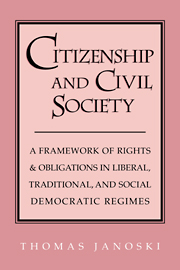 Citizenship and Civil Society
Citizenship and Civil Society Book contents
- Frontmatter
- Contents
- List of Figures and Tables
- Acknowledgments
- 1 Introduction to Citizenship
- 2 The Framing of Citizenship Rights: Expansion, Clarification, and Meaning
- 3 Reconstructing Obligations and Patriotism: Limitations, Sanctions, and Exchange in a System of Rights
- 4 Citizen-Selves in Restricted and Generalized Exchange
- 5 The Balance of Rights and Obligations through Nesting, Civil Society, and Social Closure
- 6 Incremental Change in Citizenship over Decades: Power Resources, State Structures, Ideology, and External Forces
- 7 Momentous Change in Citizenship over Centuries: From Wasps to Locomotives in the Development and Sequencing of Rights
- 8 Conclusion and Implications
- Notes
- References
- Subject Index
- Name Index
6 - Incremental Change in Citizenship over Decades: Power Resources, State Structures, Ideology, and External Forces
Published online by Cambridge University Press: 05 June 2012
- Frontmatter
- Contents
- List of Figures and Tables
- Acknowledgments
- 1 Introduction to Citizenship
- 2 The Framing of Citizenship Rights: Expansion, Clarification, and Meaning
- 3 Reconstructing Obligations and Patriotism: Limitations, Sanctions, and Exchange in a System of Rights
- 4 Citizen-Selves in Restricted and Generalized Exchange
- 5 The Balance of Rights and Obligations through Nesting, Civil Society, and Social Closure
- 6 Incremental Change in Citizenship over Decades: Power Resources, State Structures, Ideology, and External Forces
- 7 Momentous Change in Citizenship over Centuries: From Wasps to Locomotives in the Development and Sequencing of Rights
- 8 Conclusion and Implications
- Notes
- References
- Subject Index
- Name Index
Summary
The power resources approach expects class to be one of the major determinants of conflicts of interest in Western societies, holds that inequality in the distribution of power resources is of central interest but assumes that the degree of inequality can vary over time and between countries, and accords political democracy an important role in the processing of conflicts of interest.
Walter Korpi (1989, pp. 309–10)A “structured polity” approach to explaining the origins and transformation of national systems of social provisions … draws our attention to four kinds of processes: (1) the establishment and transformation of state and party organizations through which politicians pursue policy initiatives; (2) the effects of political institutions and procedures on the identities, goals, and capacities of social groups that become involved in the politics of social policy-making; (3) the fit … between the goals and capacities of various politically active groups, and the historically changing points of access and leverage allowed by a nation's political institutions; and (4) the ways in which previously established social policies affect subsequent politics.
Theda Skocpol (1992, p. 41)Citizenship is the outcome of class struggles, war, migration and egalitarian ideologies.
Bryan Turner (1986a, p. 67)Four approaches to the development of rights and obligations in advanced industrialized countries are brought together to form one model in this chapter. When dealing with “subjects” (i.e., internal non-citizens), one approach focuses on the strength of class and status groups in social movements, and another stresses the comparative capacities of state bureaucracies and institutions in creating, administering, and enforcing rights.
- Type
- Chapter
- Information
- Citizenship and Civil SocietyA Framework of Rights and Obligations in Liberal, Traditional, and Social Democratic Regimes, pp. 142 - 172Publisher: Cambridge University PressPrint publication year: 1998


